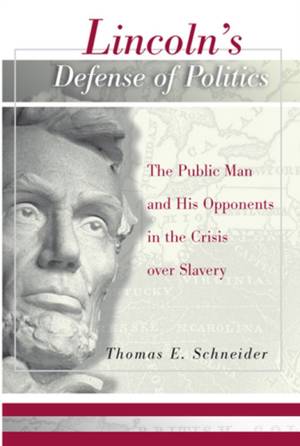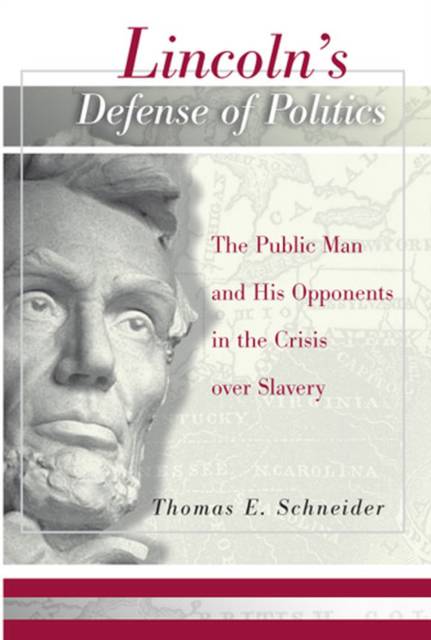
- Afhalen na 1 uur in een winkel met voorraad
- Gratis thuislevering in België vanaf € 30
- Ruim aanbod met 7 miljoen producten
- Afhalen na 1 uur in een winkel met voorraad
- Gratis thuislevering in België vanaf € 30
- Ruim aanbod met 7 miljoen producten
Zoeken
Lincoln's Defense of Politics
The Public Man and His Opponents in the Crisis Over Slavery Volume 1
Thomas E Schneider
€ 74,45
+ 148 punten
Omschrijving
Abraham Lincoln is chiefly remembered for two historic achievements: he freed the slaves, and he saved the Union. That Lincoln did these things is not controversial. What is controversial is the connection between the moral and constitutional aspects of these achievements. Lincoln refused to see pro-Union and antislavery principles as exclusive, and thus he would not uphold one set of principles to the exclusion of the other or allow one to serve in the other's place. Lincoln's opponents of the time denied these connections. They felt obliged to take sides and to choose between morality and the law. In Lincoln's Defense of Politics, Thomas E. Schneider examines six key figures from among the two groups that were Lincoln's opponents: the states' rights constitutionalists--Alexander H. Stephens, John C. Calhoun, and George Fitzhugh--and the abolitionists--Henry David Thoreau, William Lloyd Garrison, and Frederick Douglass. Lincoln differed from both groups in his political attitude toward the question of slavery. He made it clear that he regarded his own approach as more comprehensive than the more narrowly focused constitutional and moral ones favored by his opponents. Schneider uses the men from each of these groups to illustrate the broad significance of the slavery question and to shed light upon the importance of political considerations in public decision making. Secession and war deprived Abraham Lincoln of the opportunity to demonstrate to the South that while he was opposed to any further extension of slavery, he bore no feelings of ill will toward the southern people. Lincoln did not expect southerners to concur with his party's view of slavery as morally wrong, but he called on them as "national men" to consider whether sectional harmony was likely to be restored on any basis other than the one proposed by the Republicans. Slavery, he believed, was the only thing that could threaten the integrity of the nation.Lincoln's Defense of Politics is not primarily a work of history but a consideration of historical alternatives on their merits. It addresses itself to a question of perennial interest and significance: what is the nature and value of politics? Political theorists as well as students and scholars of American political thought will find this work of particular importance.
Specificaties
Betrokkenen
- Auteur(s):
- Uitgeverij:
Inhoud
- Aantal bladzijden:
- 240
- Taal:
- Engels
- Reeks:
Eigenschappen
- Productcode (EAN):
- 9780826216069
- Verschijningsdatum:
- 18/11/2005
- Uitvoering:
- Hardcover
- Formaat:
- Genaaid
- Afmetingen:
- 161 mm x 236 mm
- Gewicht:
- 512 g

Alleen bij Standaard Boekhandel
+ 148 punten op je klantenkaart van Standaard Boekhandel
Beoordelingen
We publiceren alleen reviews die voldoen aan de voorwaarden voor reviews. Bekijk onze voorwaarden voor reviews.











